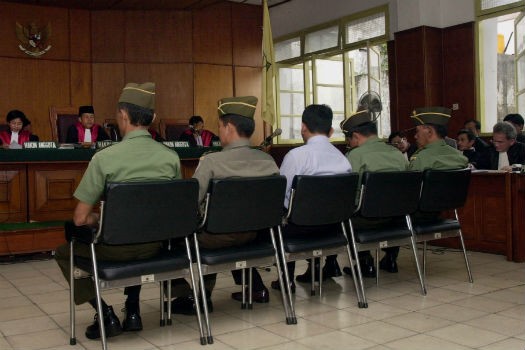As we look back on 15 years of ICTJ's work, we recognize that our greatest asset is the people whose knowledge, experience, and dedication made our contribution possible. To celebrate all who have been part of ICTJ’s story over the years, we asked some of our former colleagues to share their reflections and memories of moments that stand out: moments that throw the stakes of our work into sharp relief. In the weeks and months to come we will bring you their stories in Reflections on the Struggle for Justice.
Caitlin Reiger, ICTJ's former Deputy Director of Prosecutions (2005–2010), reflects on the humanizing power of testimony, on display in East Timor.
| It is 2002 and I am sitting in a courtroom in East Timor on the day that the first crimes against humanity trial begins. It was a long-anticipated moment for those who had suffered the violence of 1999 and those who campaigned for justice. The accused are a group of ten young men accused of having been members of a feared pro-Indonesian militia, who, among other things, were accused of ambushing a truck carrying nuns and journalists, and subjecting them to extensive abuses, culminating in several brutal murders. Having been seen as invincible, would this process bring them to account? |
It was a powerful scene to see the defendants, with hardened features and a still persistent bravado, finally lined up on the accused’s bench in front of the judge. I remember thinking that if justice can finally be brought to bear on men like these, who had enjoyed such blatant impunity, there is hope. Many of us present that day had heard or read detailed firsthand accounts and it was still hard to imagine their reported capacity for such violence.
An elderly woman was the first to give testimony. As she rose, her frailty was striking. Bowed by age, and maybe by the hardships she endured, she cut a tiny figure set against the backdrop of these self-proclaimed tough guys.
The judge asked her to identify the men in the dock. Without missing a beat, she strode toward the line of accused men, each of whom loomed even bigger as she approached. Then she proceeded down the line, naming each one as she went, looking them straight in the eyes and reaching up to give each a violent prod in the chest with her forefinger as she declared his name.
Recognizing the power of her own voice, she concluded her tour by describing how she knew them all when they were young. “These boys were like my sons!” she exclaimed, turning toward them in disgust. Her outrage, disappointment and hurt was so palpable and raw that it inspired awe.
With these few words and the platform her testimony provided, she simultaneously reduced their power and somehow also restored their humanity. They were no longer the face of evil; they were admonished as wayward boys, who had gotten involved something they had little control over, and who now had to face the consequences of their actions both to the law and their community.
PHOTO: Five senior police and military officers stand trial in East Timor in 2002.
